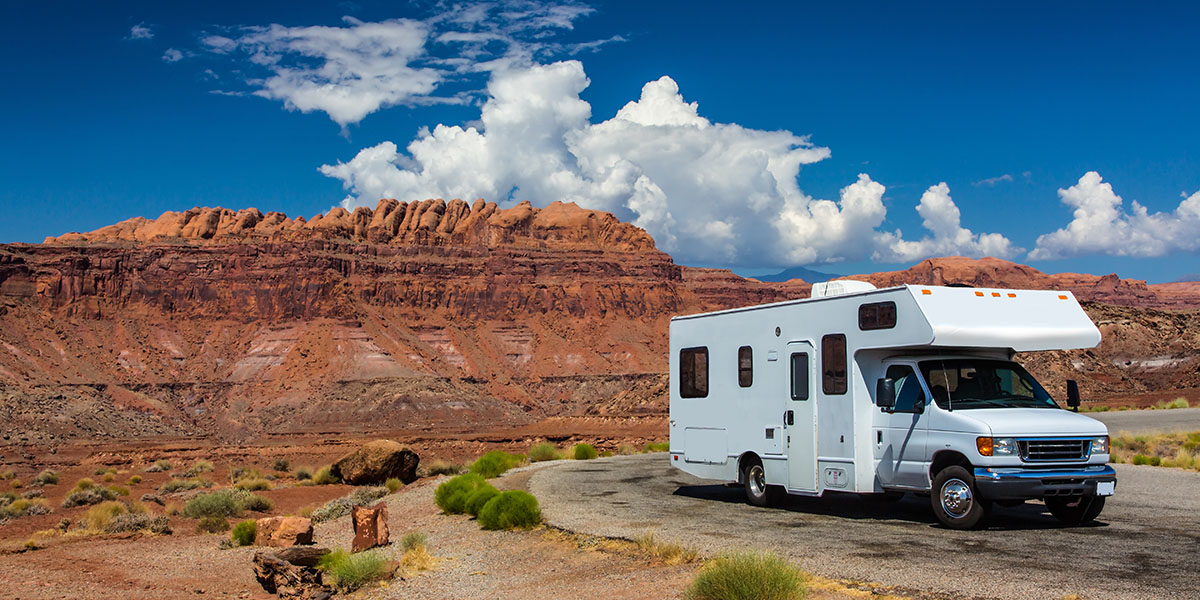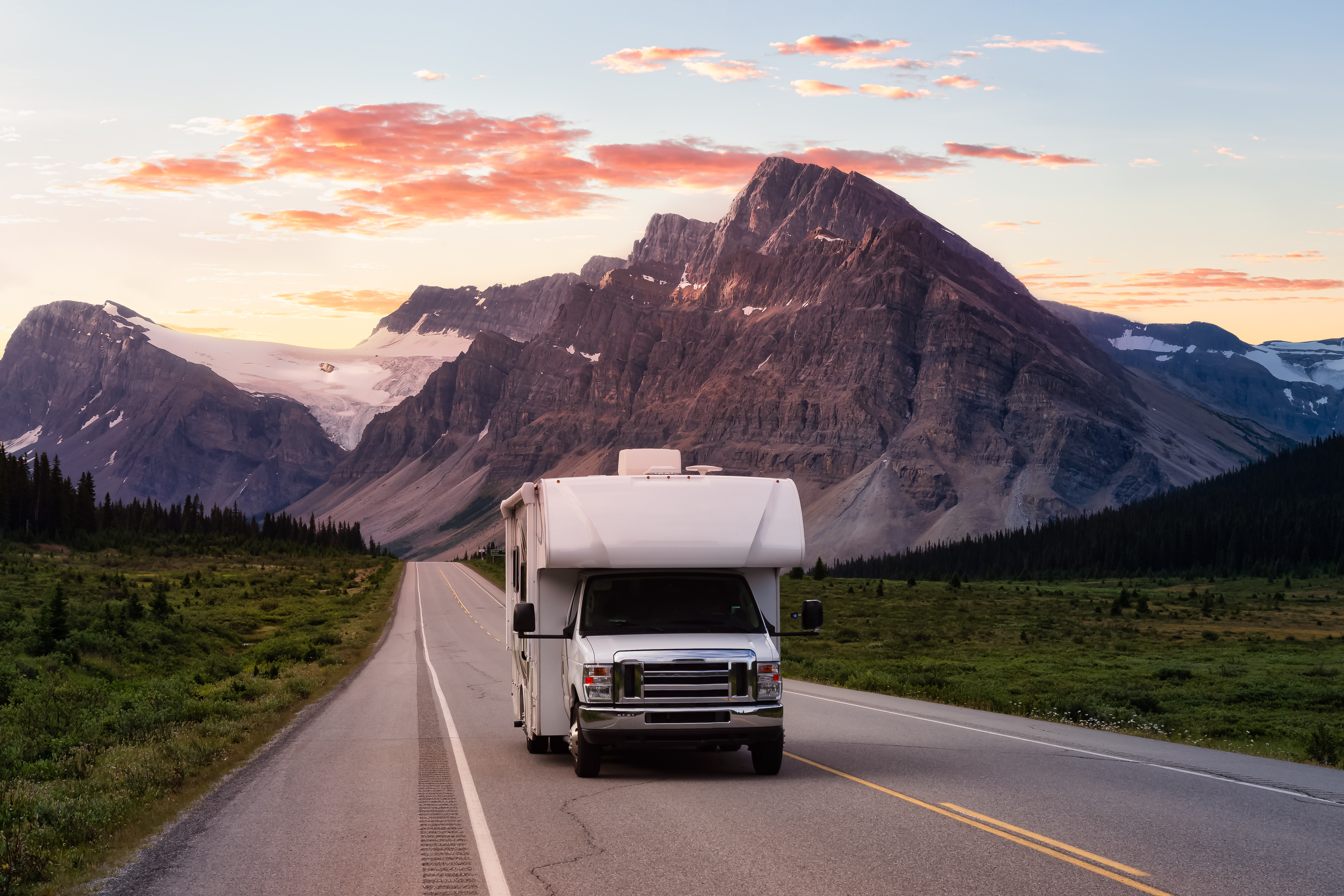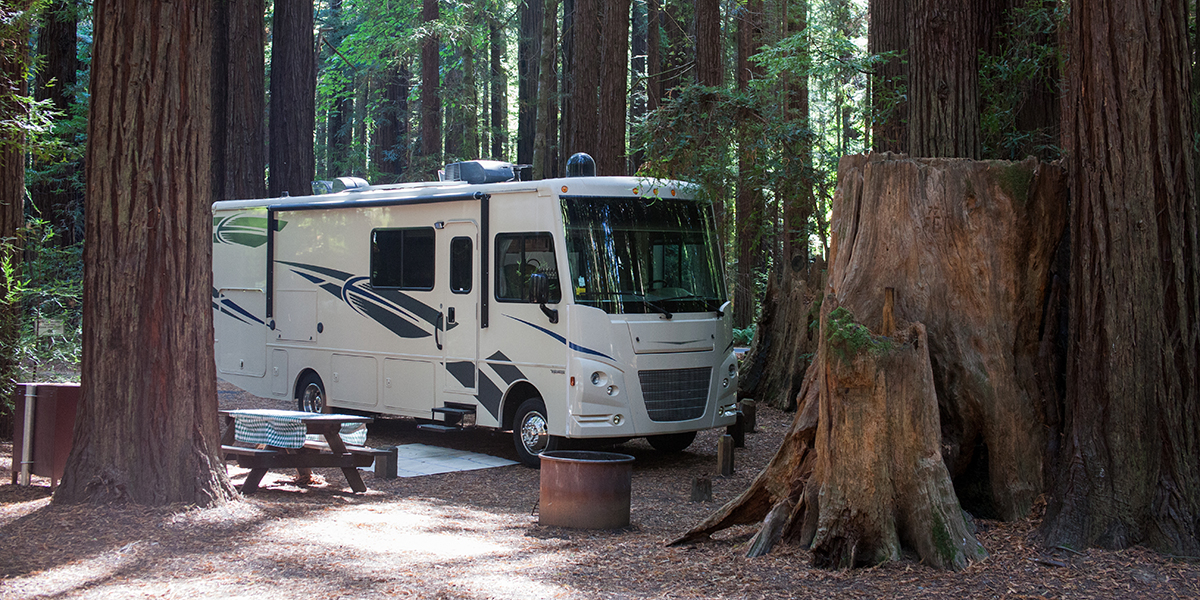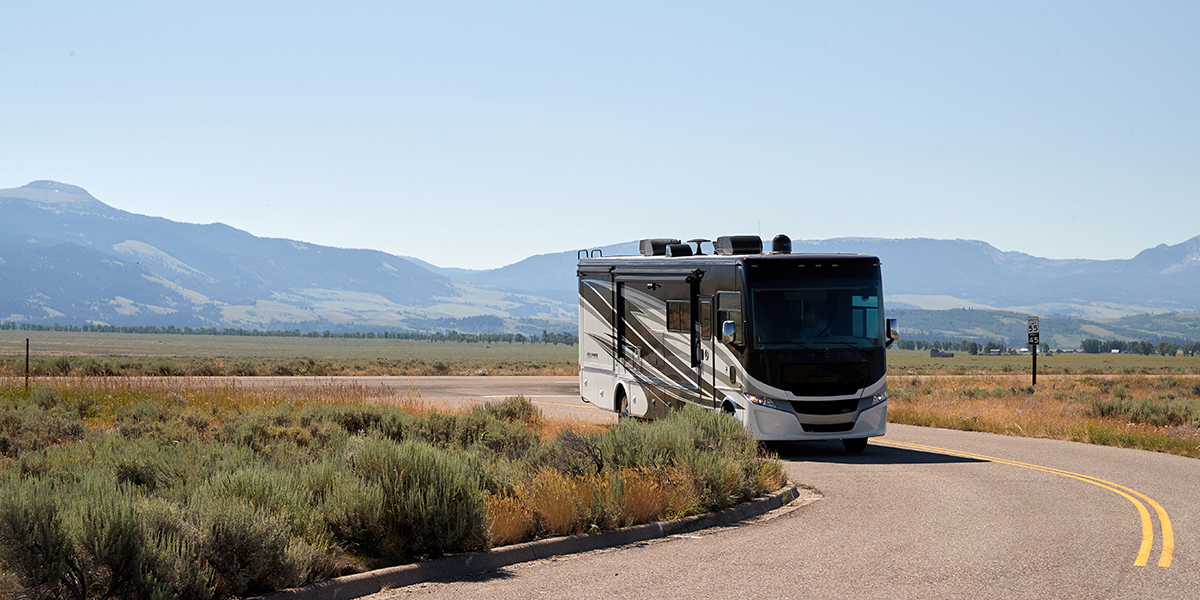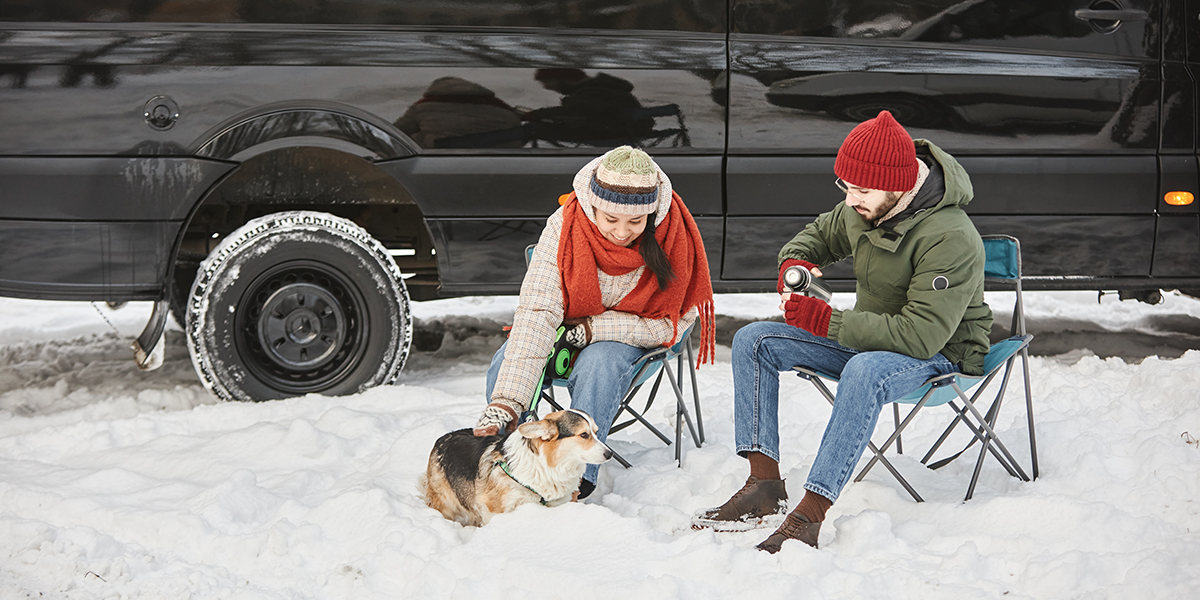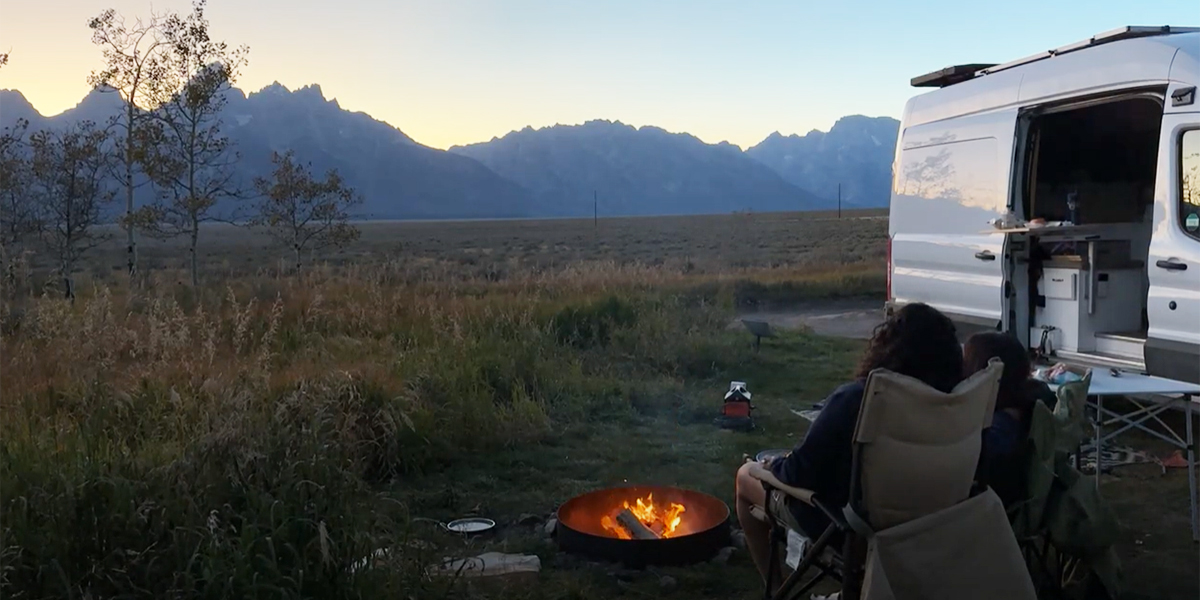There’s nothing more unsettling than feeling unsafe in your own home. That certainly goes for your RV if you’re caught in the midst of an extreme weather event. Your RV is your home base and safe place, but events like tornados can change that. In an instant. That’s why it’s paramount to take RV tornado safety seriously, both before extreme weather arrives and any time it might catch you in park.
From having the right safety products to performing maintenance checks and servicing, proper preparation can be the difference-maker between a mere inconvenience and a Significant Emotional Event — like the kind everyone seems to be experiencing in the new “Twisters” movie. Because when the stuff starts hitting the fan, some smart choices can make a life-or-death difference with RV tornado safety.
First: Be Prepared
Stock some supplies.
You don’t have to be a doom-and-gloom prepper to be properly prepared for emergencies. Emergency food can last even up to three to five years. And it is well worth the space it takes. Stow some away, along with enough water for at least a weekend.
Do your maintenance.
One thing that heavy weather will do is to find your weak points. Tires, roofs, heaters, and fuel levels — each can be a major weak point if not appropriately monitored and maintained. Perform regular checks, and service as needed before problems arise at the worst possible time.
Check weather as a part of every pretrip checklist.
From stocking up on the right supplies to bringing the right clothing, it’s never a bad idea to be prepared for whatever Mother Earth is going to throw at you.
Pack a go-bag.
In addition to knowing where your emergency supplies are, you might feel more warm and fuzzy knowing that your most important survival items are all safe in one place. And when it’s time to go, whether during or after an emergency, you need it all in one easily grabbable place. This is the go-bag’s job. Store some emergency food, a light source, and a backup power source in your go-bag.
Have a backup power source.
These days emergency battery solutions have gotten cheap enough that you should never be caught without a battery that can charge phones, communication devices like computers or tablets. Consider getting a power bank with 10,000 mAh (milliamp hours) for the rig, and a portable power source in case you need to charge phones on the go.
Store enough sustenance for your situation.
Think about what would happen if your RV were catastrophically destroyed, but you survive. If you’re in the boonies, how long of a walk is it to the nearest source of safety? Store enough food and water for at least a few days. If not walkable, plan to survive a week or more.
What to Do When a Major Storm Is Approaching
While we celebrate the idea of being phone-free in your RV, when weather is on its way you need to take another approach. Situational awareness is one of your most important assets, and your phone is key. Because — flat out — you don’t want to be caught in your RV in a tornado. Enable alerts and notifications for your favorite weather app to stay aware of any important changes in storm tracks, tornado watches or warnings, or other important alerts.
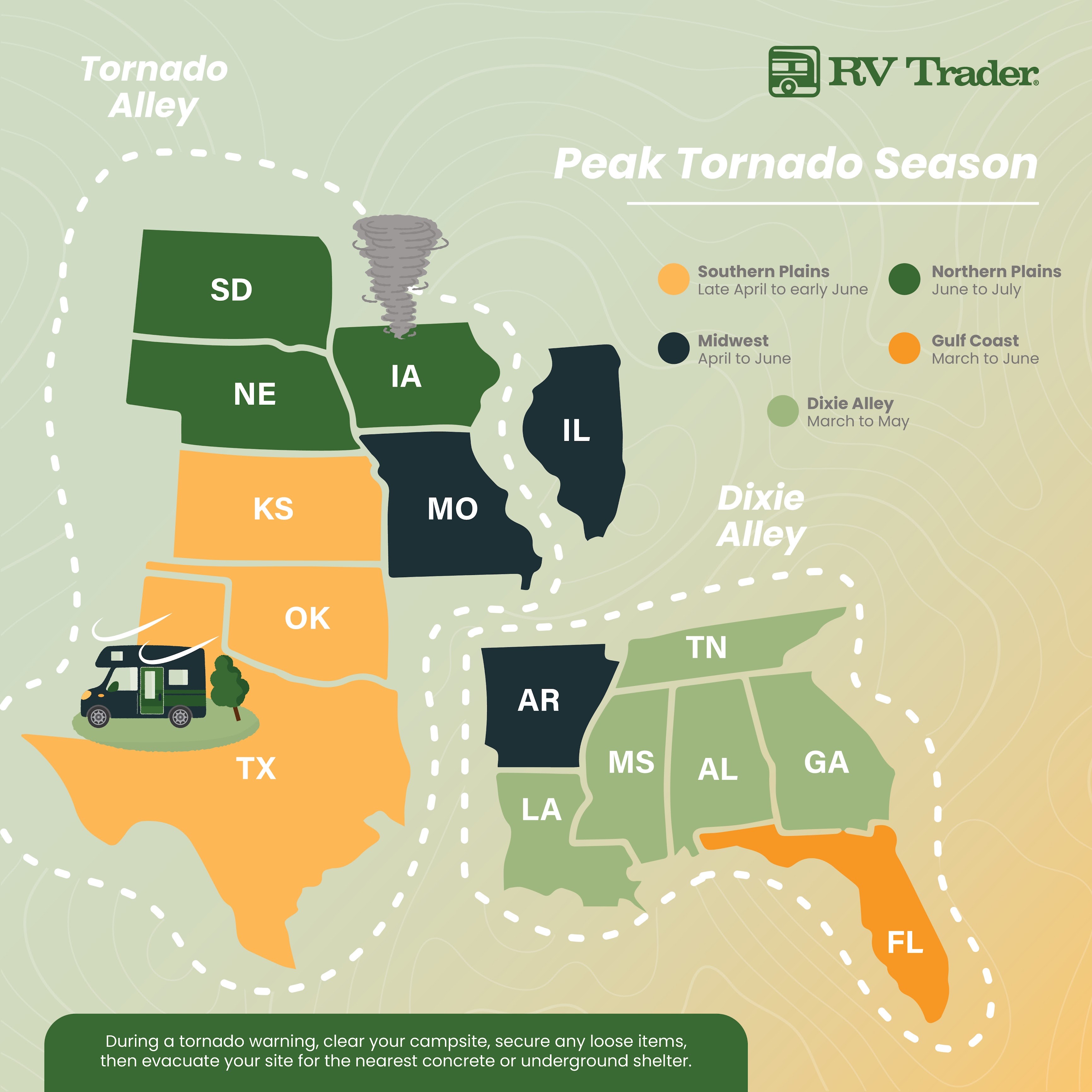
Depending on what kind of weather event is approaching, you’re never helpless. The easiest way to avoid tragedy is to reduce risk. If severe weather is on the horizon, the smartest way to avoid risk might be to let Mother Nature win the battle so you can win the war. In other words, don’t risk it. Pick another weekend to camp. As an old Army instructor of mine used to say before any dangerous training mission, “There’s always tomorrow… if you make it there!” Don’t be afraid to play it safe and live to camp another day.
If you’re in a RV park, national park or campground, consider what fortified buildings might be around. In many cases, a bathroom facility, front desk, clubhouse or even a solid pool bathroom might be more suited to take gale-force winds or even tornados.
When Emergency Weather Arrives
If you know you’re going to be sticking it out through a serious storm, potential tornados, or other significant weather event, we have a few tips to help you batten down the RV hatches, but don’t miss this first one: Don’t be inside your RV in a tornado event. You need to get out, find shelter, or even lie in a ditch. That’s RV tornado safety 101. The risk is simply too great. No matter how well you well you prep an RV, it will be a death trap if a tornado hits and you’re inside.
That being said, if you’re tracking the weather and know the storm is a few hours away, there are some smart things you can do to protect yourself and your RV.
-
Batten down the actual hatches.
Remove any wind-catching awnings or slide-outs. Close vents and windows. Tie up or chain down anything that can be tied up or chained down.
-
Plan an escape route.
Know what you’ll do to escalate your safety needs if things get worse than expected and staying put stops being an option.
-
Reduce the risk of wind.
You can reduce the risk of damage in high-wind scenarios by positioning your RV, camper, or trailer into the wind. This reduces the drag your rig will feel, and also minimize your exposure to blowing debris.
-
Hitch up to your tow vehicles.
Your combined weight will keep you more wind-resistant and serve as an anchor in the storm. If your surroundings allow, be sure both vehicles are turned into the wind.
-
Communicate with loved ones.
In any catastrophic weather event, communication can get sketchy. It’s important to keep loved ones (or someone at least) aware of your location and current situation. That way, if things really go south, someone at least knows where to look for you to send help.
-
Consider reparking for safety.
If major heat is the issue, look for cover from large branches or trees. If wind and rain are the primary hazards, you may benefit from parking next to a hill or large building, but you should avoid overhanging branches. And consider moving away from any streams or rivers that might flood.
-
Share your location.
Particularly when boondocking, make sure someone knows your exact location, how to get there, and when to expect you to check in if able.
-
Stay off the road.
It may be tempting to run (or in this case, drive) for cover, but unless you have an acute emergency and need help, it’s not likely wise to drive your way out of a storm. If you’re caught on the road in the midst of an extreme weather event, even driving can be deadly dangerous. If there’s no shelter nearby, you need to get out of the vehicle and lie in a ditch.
Let’s just be clear: Trying to wait out an emergency weather event like a severe storm or tornado in an RV is not safe. It’s not recommended. Ever. You should do everything you can to avoid it. Even if that means — here it is again —lying in a ditch.
But there are plenty of steps you can take to make sure you’re prepared as best you can for RV tornado safety. RVing is full of adventure, and not for the faint of heart. But for the bravest adventurers it can be a route to a full life. Here’s hoping that your journeys are smooth — and that the only twisters you encounters are the ones hitting theaters! (Seriously, is that a firenado?!) Friends, stay safe out there.
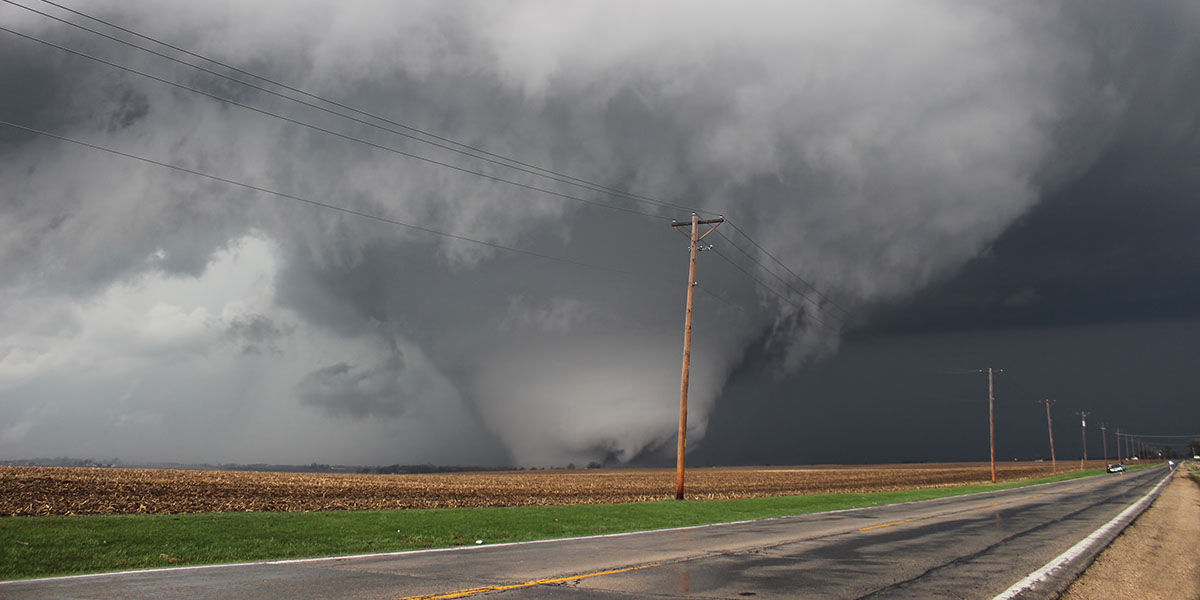
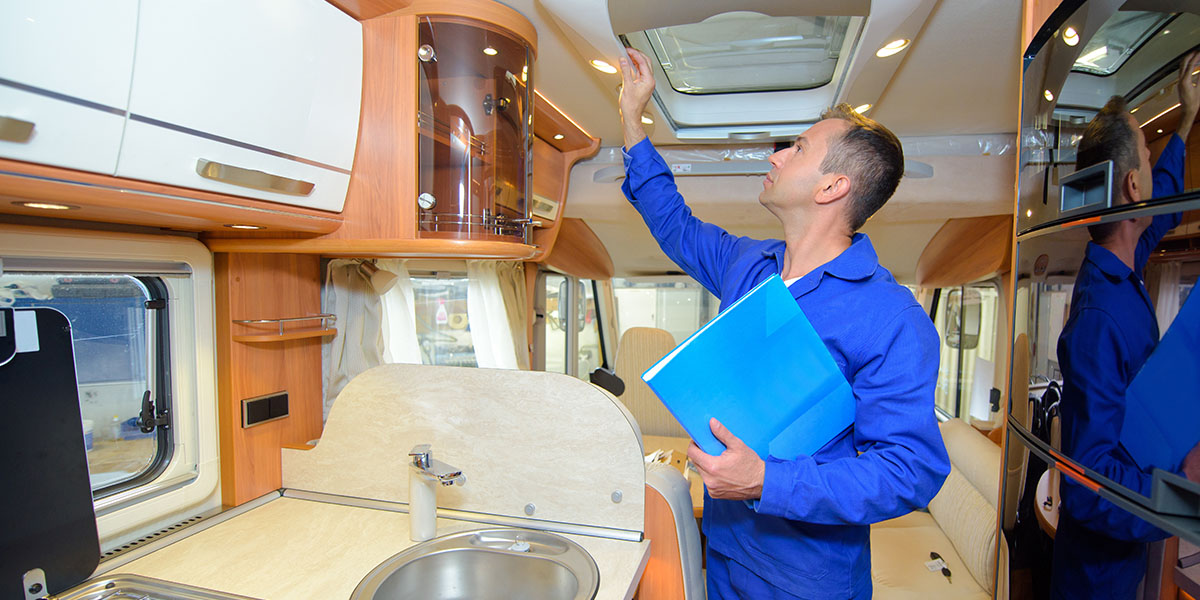


 Adjust prices seasonally or offer discounts for longer rentals to attract more renters. By strategically pricing your RV rental, you can maximize earnings and ensure steady bookings. If using a rental site, know that many have guidelines on pricing and how to maximize your rental income.
Adjust prices seasonally or offer discounts for longer rentals to attract more renters. By strategically pricing your RV rental, you can maximize earnings and ensure steady bookings. If using a rental site, know that many have guidelines on pricing and how to maximize your rental income.